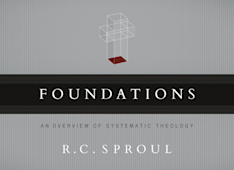Death and the Intermediate State
“For to me to live is Christ, and to die is gain. If I am to live in the flesh, that means fruitful labor for me. Yet which I shall choose I cannot tell. I am hard pressed between the two. My desire is to depart and be with Christ, for that is far better.”
On this side of glory, we see God only by faith. A day is coming, however, when we will see our Creator face-to-face, when we will enjoy the beatific vision (1 Cor. 13:12; 1 John 3:2). The teaching that we will see God’s face in glory falls under the doctrinal heading of eschatology. Eschatology, or the study of last things, addresses that which still lies ahead in our experience of redemption. To help us understand the doctrine of last things better, we will base the next few days of studies on volume 8 of Dr. R.C. Sproul’s teaching series Foundations.
Eschatology, we have said, covers those things that lie ahead of us, and for all believers except those who are alive when Jesus returns, that will include the experience of physical death. But physical death is not unique to Christians, for death comes to every person regardless of whether they believe in Jesus. Christians, however, approach death from a different perspective from that of those around us. Unlike the materialists—those who believe the physical world is all there is—we know that death is not a part of the natural order. It is an intruder that came in with sin (Rom. 5:12). Thus, we rightly hate death and prefer life.
Accordingly, we often speak of death in tragic terms. When someone dies, we lose them to our experience. People give words of sympathy such as “I am sorry for your loss.” And it is true that when someone we love dies, it is a loss for us. Yet if the person who died was a Christian, it is great gain for him. That is what Paul tells us in today’s passage, asserting that for him to die and be with Christ would be far better than to remain alive (Phil. 1:21–23).
This text from Philippians is one of the most important biblical passages on the intermediate state. We can distinguish among our current state, the intermediate state, and the final state. The final state is the best—it is our final, eternal phase of existence as resurrected persons with glorified souls and glorified physical bodies (Dan. 12:2; Rom. 6:5; 8:23). As Christians, we can describe our current state as good, for we have been rescued from sin and are being conformed to the image of Christ (Rom. 6). In between the good and the best we have the better—the intermediate state. Before Christ returns, when Christians die they do not lose consciousness; rather, they are in the presence of Christ. Their spirits dwell in perfect holiness in heaven as they await the resurrection.
Coram Deo
Orthodox Christian doctrine has never embraced the doctrine of soul sleep, which says death puts us in a state of unconsciousness. When people die, their consciousness continues, either in blessedness or condemnation as we wait for the final resurrection. That should spur us to take death more seriously and to call people to trust in Christ so that they might escape eternal conscious punishment.

